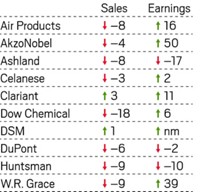Advertisement
Grab your lab coat. Let's get started
Welcome!
Welcome!
Create an account below to get 6 C&EN articles per month, receive newsletters and more - all free.
It seems this is your first time logging in online. Please enter the following information to continue.
As an ACS member you automatically get access to this site. All we need is few more details to create your reading experience.
Not you? Sign in with a different account.
Not you? Sign in with a different account.
ERROR 1
ERROR 1
ERROR 2
ERROR 2
ERROR 2
ERROR 2
ERROR 2
Password and Confirm password must match.
If you have an ACS member number, please enter it here so we can link this account to your membership. (optional)
ERROR 2
ACS values your privacy. By submitting your information, you are gaining access to C&EN and subscribing to our weekly newsletter. We use the information you provide to make your reading experience better, and we will never sell your data to third party members.
Business
Big Chemical Firms See Strong Third Quarter
Earnings: Diversified chemical makers managed their way to profits despite lumpy markets
by Melody M. Bomgardner
October 30, 2014
| A version of this story appeared in
Volume 92, Issue 44

In the third quarter, one word was used by executives to describe global demand for chemicals: volatile. Dow Chemical, DuPont, Celanese, and Huntsman Corp. were able to take advantage of their diverse businesses and flexible management to significantly grow profits compared with the year-ago quarter.
Nevertheless, Dow and DuPont, in particular, continue to fend off pressure from activist investors to break into smaller, more specialized businesses.
At Dow, earnings shot up 43.6% to $860 million, even though sales edged up less than 5% compared with the year-ago quarter. The company attributed its success not to a revved up economy but rather to its low-cost feedstocks, geographic diversity, and high operating rates.
Dow did see 6% sales growth in emerging economies, thanks to strong demand in areas such as its Latin American performance plastics business. With both operating rates and prices on the upswing, the firm’s overall profit margin moved from 4.4% to 6.0%. Dow’s earnings per share of 72 cents beat analyst expectations by 6 cents.
At DuPont, results were in line with expectations. Earnings expanded by more than a third, reaching $477 million compared with last year, while sales shrank by 2.9% as a result of portfolio adjustments, a weak agriculture market, and a sluggish economy. Sales grew in only two of seven segments—industrial biosciences and nutrition and health. Bright spots for demand included insecticides and fungicides in Latin America and enzymes for the ethanol industry in the U.S.
In conference calls with analysts, both Dow CEO Andrew N. Liveris and DuPont CEO Ellen J. Kullman stressed that they expect markets to remain volatile and that they rely on their diversification to generate profits.
Still, both giants are feeling heat from activist investors and are rearranging their portfolios significantly. Liveris reiterated his plan to divest up to $6 billion worth of assets, including Dow’s chlorine-related businesses, and Kullman said DuPont’s spin-off of its performance chemicals business is on schedule.
Flexibility was a factor in the 30.9% jump in earnings reported by Celanese. The firm benefited from successful new products in its advanced engineered materials business, while lower demand for emulsion polymers in Europe was a drag on its industrial specialties segment.
Huntsman saw comparatively broad growth, including in demand for polyurethane materials, amines, aerospace composites, and environmentally friendly textile dyes and chemicals. Overall, it raised earnings by 11.4% compared with the year-ago quarter. The firm said it is on track to integrate its recent acquisition of Rockwood Holdings’ performance additives and specialty titanium dioxide businesses.







Join the conversation
Contact the reporter
Submit a Letter to the Editor for publication
Engage with us on Twitter